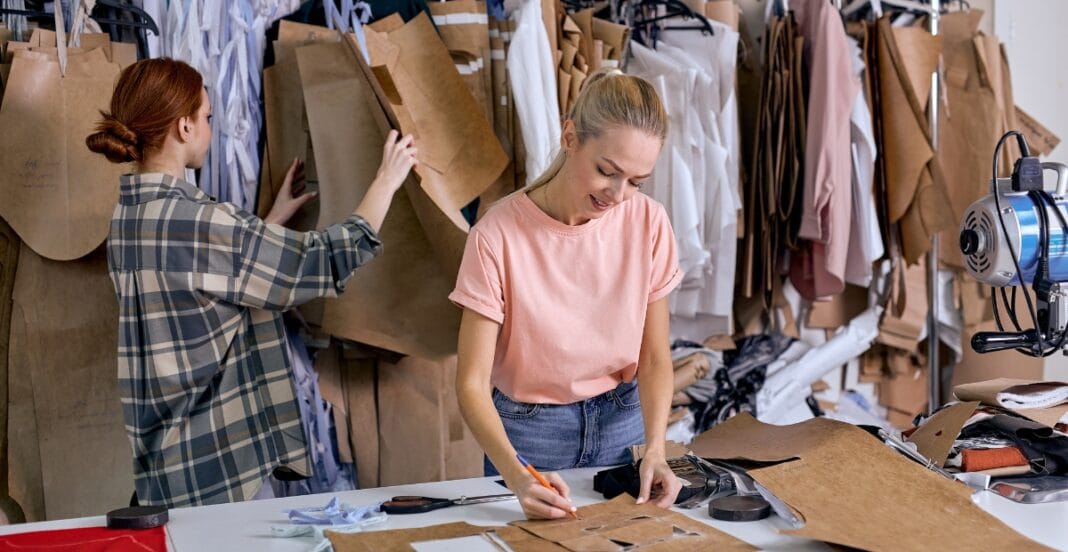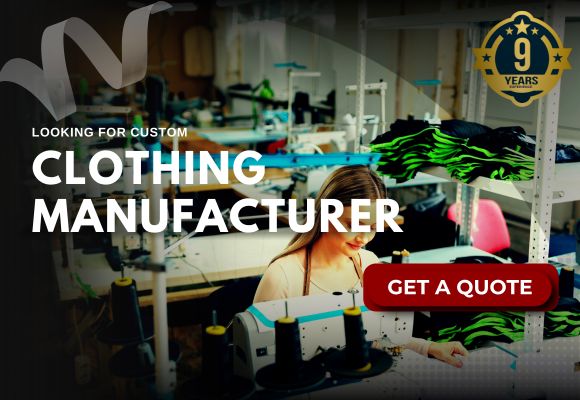Introduction: Why Choosing a Clothing Manufacturer Wisely Matters
Choosing a clothing manufacturer for your fashion business is vital to the quality, reputation, and long-term growth of your business, whether it is a startup brand or an established label. The manufacturer you partner with directly impacts these five. Too many entrepreneurs make hurried decisions and pay the price for these shortcuts later. This is exactly why it is important to learn the mistakes to avoid when choosing a clothing manufacturer. Proper knowledge lets you save on costs, and business foundations, along with lesser stress.
In choosing a clothing manufacturer, some people seem to pay more attention to price and time than necessary. The truth is, the little things that seemingly get overlooked get to break or make a business. Tiny mistakes can lead to substantial losses in production, defective clothing items, and even legal conflicts. Exercise caution when planning the steps for choosing a clothing manufacturer. The fashion business is very competitive. There is little room for losing or mismanaging resources and time.
Companies in the fashion business make the same mistake of choosing a clothing manufacturer ten times. This is precisely why we have to explored each one in details. Each subsection clarifies the issue along with a potential way of solving it.
You will attain confidence and certainty in selecting a clothing maker by avoiding these mistakes. Their impact on your clothing brand’s reputation can be detrimental or helpful. It is time to explore what mistakes you can afford to ignore.
Absence of a Working History
In the case of clothing manufacturers, not paying attention to a maker’s working history can be quite expensive. Easily, one of the most common places where new brands get duped the most is the manufacturer’s history, with the manufacturer’s history, and what they promise to deliver that which seems to be too good to be true. A manufacturer that has a long history of working in the fashion industry understands the importance of fabrics, supply chains, and the possible challenges that arise in the industry. It is certain they have already faced a number of challenges, and therefore know how to tackle and solve problems that may arise. It is always a risk to work with a clothing manufacturer that has no history because the chances of unsatisfactory quality, poor management, and delays in delivery are very high. These proven clothing manufacturers are very few and far in between, while the industry is saturated with new fashion start-ups.
You ought to pay attention to the clothing manufacturer checklist where to start about researching on the manufacturer’s reputation. Look for case studies, testimonials, or collaborations about the brands you work with that can act as proof of reliability. If a manufacturer has produced for multiple brands, be it a large corporation, or small venture business, that’s a good indicator that they know how to work professionally. Without this background check, you are basically gambling with your finances. Invest in this confidence and peace of mind by confirming that the manufacturer’s records and documents check out.
Selecting a clothing manufacturer with a proven portfolio helps you achieve peace of mind.
Paying Attention to Price Only
One of the gravest blunders brands commit is paying attention to price only while selecting a clothing manufacturer. Price is a factor that cannot be ignored but the cheapest price rarely provides the most value. Many low price manufacturers resort to skimping on quality fabrics, stitching, and finishing. This results in substandard quality products which is detrimental to your brand image. Hence, selecting a clothing manufacturer should focus on cost and dependability. Customers appreciate quality and offering low quality products simply to make a sale will breach their trust in the long run.
Additionally, consider hidden costs when selecting a clothing manufacturer. Shipping delays, quality issues, and product returns can cost far more than the savings you make in the beginning. In some cases, paying a little more ensures you get long lasting clothing that will delight the customers. Reflect on your brand—do you want to be associated with affordable clothing or one with reputable quality? By circumventing the mistake of focusing attention solely on price, you will make better choices. Selecting a clothing manufacturer should focus on value, not just price.
Ignoring Minimum Order Quantities (MOQs)
Ignoring the MOQs is yet another blunder that many entrepreneurs make while selecting a clothing manufacturer.
Manufacturers typically set a lower limit on order size. This entails a problem for some businesses that lack the capacity for bulk inventory. Plus, the budget and storage space could be negatively impacted and unsold stock could end up being a problem. With this in mind, a prospective clothing manufacturer needs to be specially vetted in regards to MOQs. Never forget to check order conditions prior to any signing; it brings relief in overpriced finances. This
When negotiating with a prospective clothing manufacturer, it might be possible to find MOQs that work for both. The second group might allow several different styles in a single order. Open discussion on MOQs helps all parties devise achievable goals and MOQs that are in-line with the scope of the business. This lack of details is the origin of unwarranted anguish. This mistake is erased when accurate figures are established sooner. This could be done by working with a clothing manufacturer within flexible moqs. The benefits are unimpeded growth.

Strong Communication Avoids Delays and Problems When Choosing a Clothing Manufacturer
- Clear communication prevents misunderstandings.
- Responsiveness signals professionalism.
- Project tools help align teams.
Skipping the Quality of Fabric and Material
Ignoring quality of fabric and material when working with a clothing manufacturer is asking for it. The overall reputation of the clothing line hinges on the fabric quality. This is the step that stops clothes from being easily torn or faded. Shallow brands are made by customers who make one time purchases.
This is why we give priority to a clothing manufacturer who possess exceptional fabric sourcing and control over quality. Fashion is more than just design and framework. It’s every bit of detail.
Furthermore, if your goal is to get the best clothing manufacturer, it is your duty to obtain and examine fabric samples. Understand the fabric, attempt to stretch it, and wash it to determine the robustness of the fabric. A manufacturer that is unable to offer quality samples is of no value. Thoughtful manufacturers can differentiate sample and bulk orders and maintain the same quality parameters for both. Keep in mind that a fabric gives your product its value. Don’t make the mistake of skipping over the fabric. A clothing manufacturer who is able to retain customer satisfaction is the same one who is able to implement rigorous quality control.
Poor Communication with the Manufacturer
Slick communication is a barrier for smooth workflows and therefore, the communication that surrounds a clothing manufacturer needs to be flawless. There are multiple aspects of fashion production that need precision, these are the sizes, colors, stitching, and timelines. If communication is absent, you will never get what you expect. Many entrepreneurs do not realize that these agreements are often too basic, and therefore, erroneous. It is easy to Forget the importance of communication when dealing with a clothing manufacturer, but this should not be the case. Communication is essential for any workflow and a manufacturer is no exception.
In the case that you choosing a clothing manufacturer, make sure that you assess how responsive they are to your questions.
Are they timely in their responses? Do they provide thorough answers? Communication that is slow and unclear raises red flags for issues to come. Use emails, phone calls, and project management tools to remain in sync. Poor communication results in expensive mistakes, revisions, and delays. Strong communication practices should be established from day one in order to avoid falling into this trap. Smoother collaboration and successful outcomes result from selecting a clothing manufacturer with strong customer service.

Forgetting about Ethical and Sustainable Practices
Ignoring modern day ethics and sustainable practices when selecting a clothing manufacturer is a dangerous error. Customers in today’s world are very conscious of ethical practices and the way in which clothing is produced. If your brand is perceived to have ignored sustainability, public backlash accompanied with a loss of trust may occur. It is for this reason that selecting a clothing manufacturer who employs fair labor policies and sustainable practices is important. Putting your brand under ethical production positively adds long term value, which outweighs the short term value of profit gained at the expense of customer trust.
In addition, when selecting a clothing manufacturer, look for GOTS and Fair Trade certifications. These certifications are proof of ethical practices and within that, the production of clothing. Positive brand reputation is gained by practices that reduce waste and improve fabric sourcing within your brand. If these aspects are overlooked, you will be at a disadvantage to the competitors who prioritize these practices.
To avoid these mistakes, make sure to incorporate the principles of social responsibility. Selecting an apparel production firm that embodies social responsibility helps to enhance the firm’s reputation.
Failing To Request Samples Prior To Production
Failing to request proof samples is another blunder that some businesses tend to make with apparel production firms. You cannot establish the quality, sizing and finishing of a product without the aid of samples. A promise alongside an image is simply never sufficient. Not advancing with proof samples is setting yourself up to receive an unacceptable bulk of clothing. Cumbersome and unmarketable items that you try to return can potentially damage your brand image. Opting for an apparel production firm without proof samples is akin to playing the buying game anonymously.
When it comes to apparel production, samples serve the purpose of evaluating the performance of different fabrics. The strength of a stitch, the precision of a fit, and the color that comes off the fabric can all be subjected to scrutiny. There is a certain comfort that comes with an approach prepared for the worst. On the contrary, if you are sure the materials came from a reputable firm and the firm is unwilling to provide samples, that is your first indicator that the partnership is not valid. It is better to be proactive than reactive so avoid this misstep. A cheap apparel production firm that is focused on production will provide ample samples and protective measures that guarantee reliable production.
Minimum Order Quantities Can Make or Break Your Startup When Choosing a Clothing Manufacturer
- Why overlooking MOQs is risky for small businesses.
- How to negotiate flexible order sizes.
- What to confirm before signing agreements.
Failing To Reckon With The Production Capacity And Scalability
Dismissing this factor from consideration when selecting an apparel production firm is restricting your possiblities.
It is evident that both producers and manufacturers of many niche startups experience srepid growth. However, manufacturers of small factories are often overwhelmed with orders and miss shipping deadlines, leaving customers irritated. This is why selecting a clothing manufacturer requires knowing what their maximum production capacity is. Always inquire how many pieces they can reliably turn out a month. A clothing manufacturer that you partner with can keep pace with your growth.
Furthermore, manufacturing clothing is driven by such a need to supply that production sclaebility is as important as your revenue. For instance, holiday seasons have set periods as to when they can increase production capacity to meet demand. If the manufacturer you work with is unable to scale, you will tend to miss out on these periods of heightened demand. Assess the manufacturer’s staff, production and to a degree, logistics. A partner in the business who demonstrates these traits gives you the ability to grow worry-free. This mistake is common, and only plan on surviving. Forecasting the future with a manufacturer who can demonstrate proven growth will drive you toward success.
Failing to pay close attention to Agreements and Contracts
When selecting a clothing manufacturer, skipping contracts is a concerning practice. Trusting the power of the spoken word ignores the reality of our world. Responsibilities, deadlines, the quality of work, and payment terms are a few of many issues that a contract should always include. The absence of the above mentioned can lead to losing disputes. Working with a clothing manufacturer that lacks contracts will have you setting sail without any navigational aides. This will add unwarranted risks to your brand.
In addition, when choosing a clothing manufacturer, include detail about inventions.
Safeguard every design from replication or misuse. Before divulging designs or patterns, NDAs must be in place. Contracts protect parties from one-sided responsibility for defects or delays. Getting a comprehensive agreement saves time and effort. Make contracts and comprehensive protection a priority in order to avoid this. Enhanced protection is assured as the clothing manufacturer takes care of all contracts.

Ignoring Logistics and Product Delivery Schedule
Prioritize clothing manufacturer logistics as almost a first concern. In the case of construction, proper quality worked alongside a reputable clothing manufacturer’s services ensures your business still thrives. In the modern-day, wherever your business is, punctuality is a must. Manufacturers: If your clothing arrives later than anticipated, is a matter of lost revenue, for your manufacturers. Look into a clothing manufacturer’s methods of keeping organizational logistics. Ask about your manufacturer’s available partners, shipping, punctuality, and tracking shipments.
Furthermore, consider the distant factories if the contriving partner cuts shipping time at the border more than the local partner. These both priority factors should be always in balance, as shipping cost is more than payment confirmation. Confirm punctuality contracts with your partners. Concerning logistics, your business should expect to avoid broken promises. Suppose order is placed, no more is expected. There will be no more trust. That is a given.
Conclusion
Each mistake discussed here is an expensive lesson already learned by numerous businesses. You avoid these (especially more in the future) by adopting these lessons. This allows you to create a fashion brand which is focused and thrives on quality. trust and adnreliability. Each and every step in the relation range between communication and contracts is all crucial when picking a clothes manufacturer. The right one fulfills your vision, while the other delays your vision.
Finally, when picking a clothes manufacturer, remember: patience is a virtue. Spend time in checking experience, and samples, assessing capacity, and checking logistics. Questions need to be asked, clarification is essential, and reluctance to sustainability is unacceptable. The fashion business enjoys those who pay attention to detail. Eliminating the ten mistakes discussed here, lets you control supply and your reputation. This makes choosing a clothing manufacturer a business decision, but more importantly, it is an avenue to achieve success and build a reputation.


